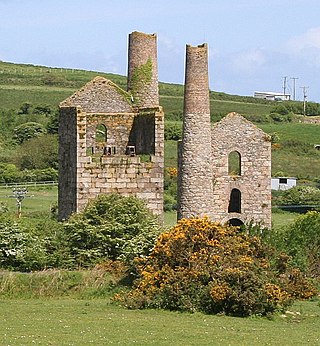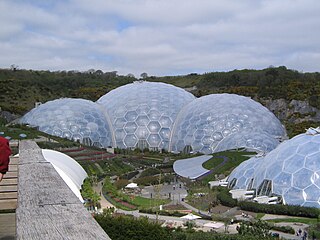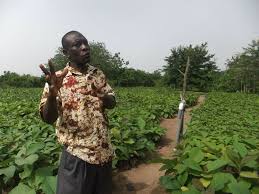
Dartington Hall in Dartington, near Totnes, Devon, England, is an historic house and country estate of 1,200 acres (4.9 km2) dating from medieval times. The group of late 14th century buildings are Grade I listed; described in Pevsner's Buildings of England as "one of the most spectacular surviving domestic buildings of late Medieval England", along with Haddon Hall and Wingfield Manor. The medieval buildings are grouped around a huge courtyard; the largest built for a private residence before the 16th Century, and the Great Hall itself is the finest of its date in England. The west range of the courtyard is regarded nationally as one of the most notable examples of a range of medieval lodgings. The medieval buildings were restored from 1926 to 1938.

The Department for Environment, Food and Rural Affairs (Defra) is a department of His Majesty's Government in the United Kingdom responsible for environmental protection, food production and standards, agriculture, fisheries and rural communities in the entire United Kingdom. Concordats set out agreed frameworks for co operation, between it and the Scottish Government, Welsh Government and Northern Ireland Executive, which have devolved responsibilities for these matters in their respective nations.

The Duchy of Cornwall is one of two royal duchies in England, the other being the Duchy of Lancaster. The eldest son of the reigning British monarch obtains possession of the duchy and the title of Duke of Cornwall at birth or when his parent succeeds to the throne, but may not sell assets for personal benefit and has limited rights and income while a minor.
Penryn Campus is a university campus in Penryn, Cornwall, England, UK. The campus is occupied by two university institutions: Falmouth University and the University of Exeter, with the shared buildings, facilities and services provided by Falmouth Exeter Plus.

Falmouth University is a specialist public university for the creative industries based in Falmouth and Penryn, Cornwall, England. Founded as Falmouth School of Art in 1902, it was later known as Falmouth College of Art and Design and then Falmouth College of Arts until 2012, when the university college was officially granted full university status by the Privy Council.
Sir Eric Dancer is a British businessman and formerly Lord-Lieutenant of Devon.
The Institute of Cornish Studies is a research institute in west Cornwall, England, United Kingdom, affiliated with the University of Exeter. Formerly at Pool, near Redruth, then in Truro, it is now on the Penryn Campus near Penryn, Cornwall.

Pool is a village in Carn Brea civil parish in west Cornwall, England. It is bypassed by the A30, on the A3047 between Camborne and Redruth, between Tuckingmill and Illogan Highway.

The economy of Cornwall in South West England is largely dependent upon agriculture, followed by tourism. Cornwall is one of the poorest areas in the United Kingdom with a GVA of 70.9% of the national average in 2015. It is one of four areas in the UK that qualified for poverty-related grants from the EU. Farming and food processing contributed £366 million to the county's economy in 2006, equal to 5.3% of Cornwall’s total GVA. The agriculture industry in Cornwall employed 9,500 people as of 2011. 23,700 more were employed in the food industry in Cornwall. The Cornish economy also depends heavily on its successful tourist industry, which contributes 12% of Cornwall's GDP and supports about 1 in 5 jobs. Tourism contributed £1.85 billion to the Cornish economy in 2011.

Devon has the 19th largest economy in England out of 46 ceremonial counties. Situated in the region of South West England, it is a maritime county. Like neighbouring Cornwall to the west, Devon is disadvantaged economically compared to other parts of southern England, owing to the decline of a number of core industries, notably fishing, mining and farming. Consequently, most of Devon has qualified for the European Community's Objective 2 status, particularly around Exmoor, Bideford Bay and the Hartland Point peninsula which is somewhat cut off from industrial Britain due to poor road and rail transport links. These areas of North Devon are, however, only around 50 miles (80 km) by boat from Swansea in Wales. A proposal which has the backing of both the Welsh Assembly Government and the South West Regional Assembly, as well as Devon County Council, is a year-round ferry service from either Ilfracombe or Bideford to Swansea, which it is hoped would stimulate economic growth in both south-west Wales and the north coasts of Devon and Cornwall.
Clyst St Mary is a small village and civil parish 3 miles (4.8 km) east of Exeter on the main roads to Exmouth and Sidmouth in East Devon. The name comes from the Celtic word clyst meaning 'clear stream'. The village is a major part of the electoral ward of Clyst Valley. At the 2011 Census this ward population was 2,326.

The Cornwall College Group is a further education college situated on eight sites throughout Cornwall and Devon, England, United Kingdom, with its headquarters in St Austell.

Agriculture in the United Kingdom uses 69% of the country's land area, employs 1% of its workforce and contributes 0.5% of its gross value added. The UK currently produces about 60% of its domestic food consumption.

Peter Randall-Page RA is a British artist and sculptor, known for his stone sculpture work, inspired by geometric patterns from nature. In his words "geometry is the theme on which nature plays her infinite variations, fundamental mathematical principle become a kind of pattern book from which nature constructs the most complex and sophisticated structures".

Launceston is a town, ancient borough, and civil parish in Cornwall, England, United Kingdom. It is 1 mile (1.6 km) west of the middle stage of the River Tamar, which constitutes almost the entire border between Cornwall and Devon. The landscape of the town is generally steep particularly at a sharp south-western knoll topped by Launceston Castle. These gradients fall down to the River Kensey and smaller tributaries.

The University of Exeter is a public research university in Exeter, Devon, England, United Kingdom. Its predecessor institutions, St Luke's College, Exeter School of Science, Exeter School of Art, and the Camborne School of Mines were established in 1838, 1855, 1863, and 1888 respectively. These institutions later formed the University of Exeter after receiving its royal charter in 1955. In post-nominals, the University of Exeter is abbreviated as Exon., and is the suffix given to honorary and academic degrees from the university.

Paul Yeboah was an educator, farmer, permaculturist, community developer, and social entrepreneur. Yeboah founded and coordinated the Ghana Permaculture Institute and Network in Techiman, Ghana, West Africa. It is located in the Brong-Ahafo Region of Ghana. The purpose of the Institute is to build and maintain a stable food system, to take care of the local ecosystems, and to improve the quality of life in the rural areas. The GPN trains students and community in sustainable ecological farming techniques. They support projects throughout Ghana; women groups, micro-finance projects; teach growing moringa; mushroom production; alley cropping, food forests development and Agroforestry.
Sir Henry "Harry" William Studholme, 3rd Baronet, is a British forester, businessman and landowner. He is the chairman of the U.K. Forestry Commission, which manages the U.K.'s state-owned forests and is the country's largest land manager. He ran the U.K. government's Regional Development Agency 2009 – 2012.
Rosemary S. Hails is a British population ecologist and entomologist and the current Director of Science and Nature at the National Trust for Places of Historic Interest or Natural Beauty. Prior to this appointment she was the Director of Biodiversity and Ecosystem Science for UK Centre for Ecology and Hydrology, managing and directing the science of 350 ecologists and hydrologists, in collaboration with the Science Director for Water and Pollution Science. Professor Hails successfully led the development of UKCEH's national capability research programme delivered by the Research Centre, which cuts across the complete portfolio of expertise. She has led the Valuing Nature Programme for NERC, since October 2014, and is currently a CoInvestigator in the NERC Funded "RENEW" and "RestReco" Projects. In 2000, she was made a Member of the Most Excellent Order of the British Empire (MBE) for services to environmental research.












